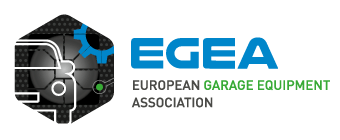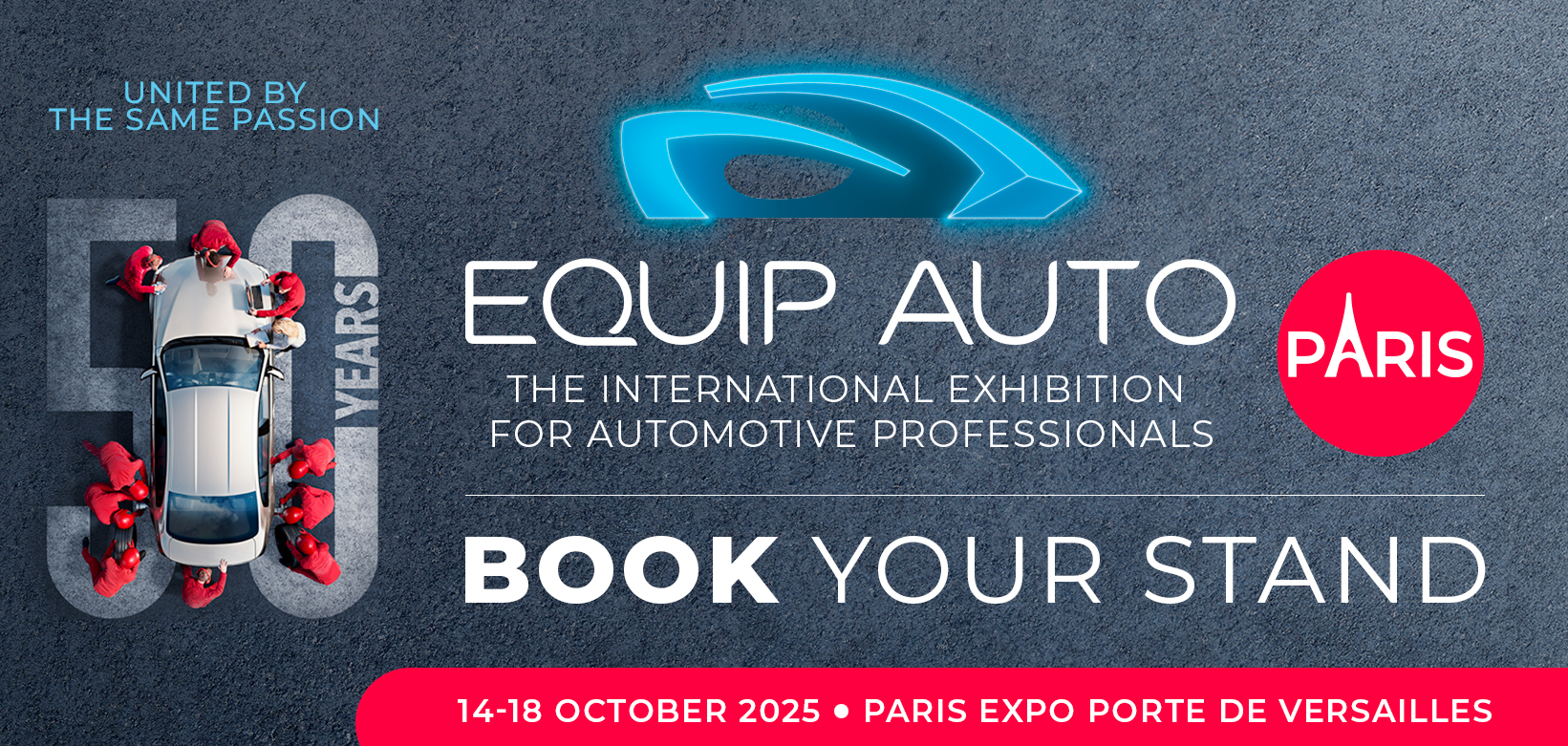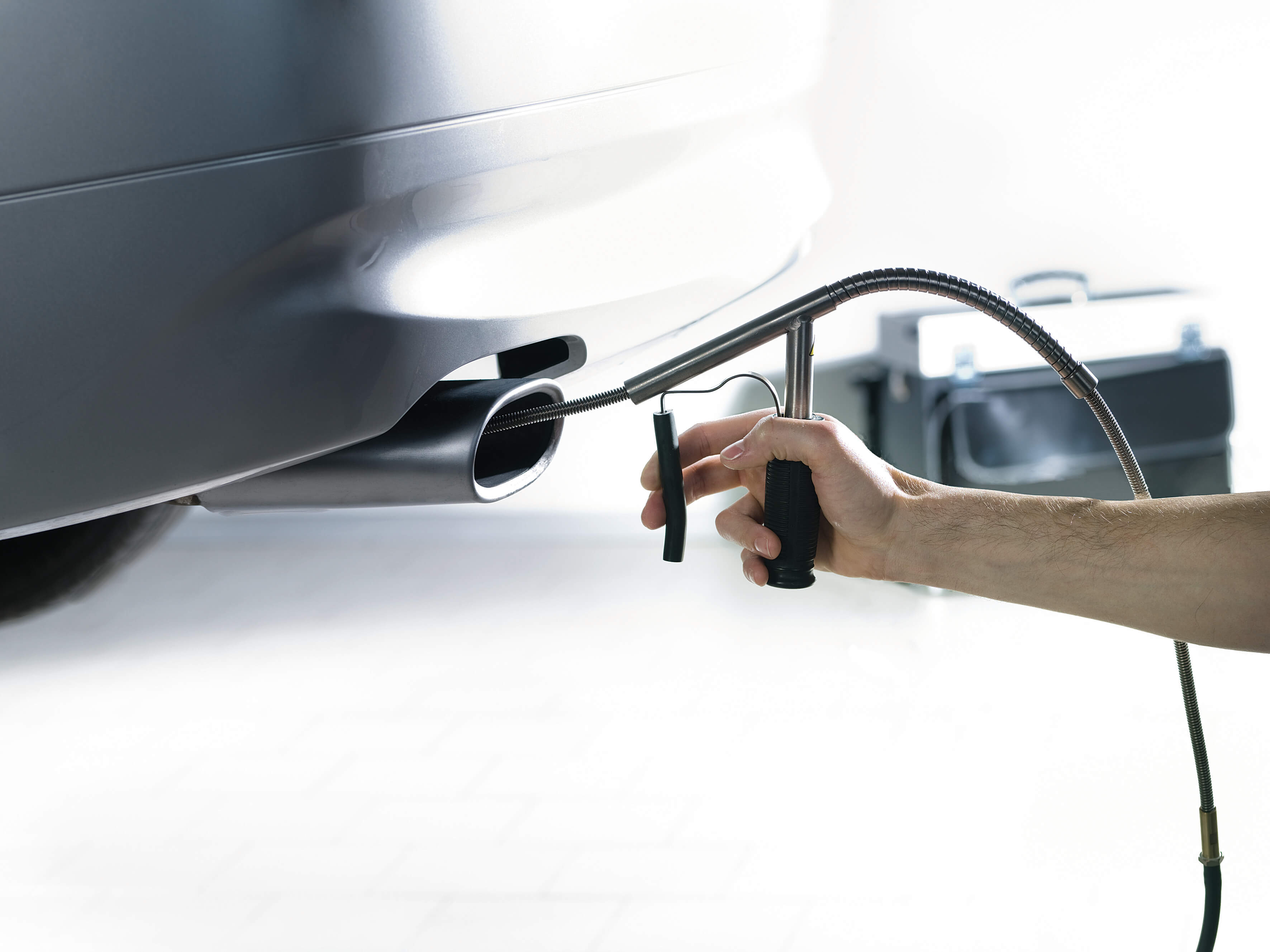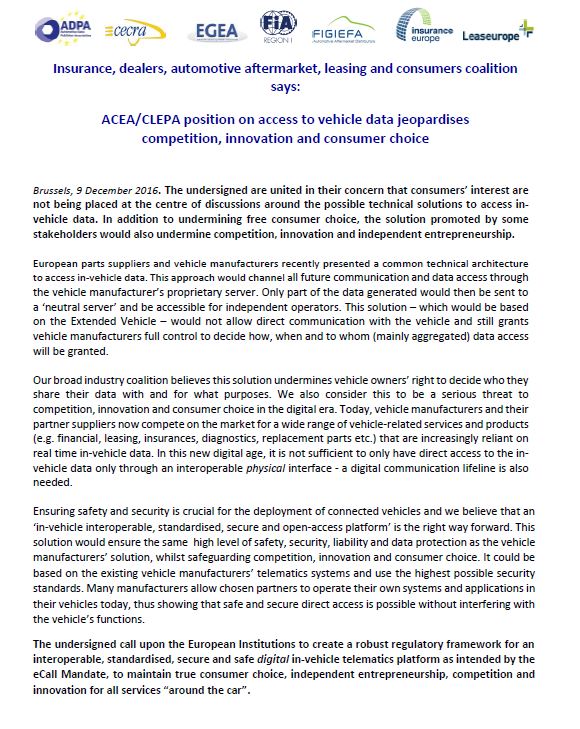Fair and Equal Access to Vehicles in a Digital Single Market
Implementing the eCall mandate on the ‘interoperable telematics platform’ in line with the principles for fair competition and free consumer choice
The Europe-wide mandatory introduction of ‘eCall’ in all new passenger cars from 2018 will accelerate the deployment of telematics technology and the development towards the ‘smart connected car’. The eCall basic telematics functionalities can easily be extended to provide a wide-ranging array of remote services such as traffic information, hotel bookings, directions to the nearest parking place, usage based insurance schemes, breakdown services or – in the case of the automotive aftermarket – remote diagnostics or predictive maintenance.
The undersigned associations represent a wide range of stakeholders directly impacted by the telematics deployment, such as motoring consumers, leasing companies and the entire aftermarket sector representing parts producers, parts wholesalers, diagnostic and test equipment manufacturers, data publishers as well as repairers.
The undersigned associations do welcome the technological advance, which can benefit consumers and provide innovative new business opportunities – as long as fair competition is safeguarded.
Currently, telematics platforms are technically designed in a proprietary way that allows only vehicle manufacturers to have direct access to the vehicle and its data – creating an undue advantage, which could ultimately be to the detriment of consumers, businesses, the European economy and society.
The EU Institutions acknowledged this challenge through Article 12 (2) of the eCall Regulation requiring the Commission to ‘assess the need of requirements for an interoperable, standardised, secure and open-access platform’. The Commission is due to decide on a legislative initiative by June 2017.
One of the concepts under discussion suggests channelling the remote communication for independent market operators through the vehicle manufacturers’ proprietary servers (the ‘Extended Vehicle’). This would give vehicle manufacturers exclusive control of access to in-vehicle data and information (who, when, what, how), allowing them to determine the access conditions, impose their own business models and monitor the businesses and processes of independent stakeholders – with whom they directly compete in the Automotive Aftermarket and with a wider range of other vehicle-related services (e.g. financial, leasing, insurances). This would negatively impact independent operators and service providers’ ability to compete.
‘Competition neutrality by technical design’ is required to preserve entrepreneurial independence and maintain a level playing field in the digital era. True innovation and the opportunity to develop new business models will only be possible through an interoperable platform.
Independent service providers need equal access to the same functionalities and information with the same timescale as the vehicle manufacturer to compete. Only then will motoring consumers have a true choice of service providers and be able to authorise the direct, unmonitored access to their vehicle-related data for the services they choose. This will in turn guarantee that alternative, independent service options can continue to be offered.
Therefore, the undersigned associations call upon the European Institutions to recognise the competitive role of telematics and so empower consumers to choose partners to whom and for which purpose they will give their data. This means also enabling independent operators to offer competitive digital products and services by protecting their right of direct access to in-vehicle real-time data/information and of online communication through standardised, interoperable and secure telematics interfaces. The design of the open-access telematics platform shall preclude the possibility of monitoring and profiling by vehicle manufacturers. It will safeguard an equal opportunity for independent operators and service providers to present their services to consumers via e.g. the embedded in-vehicle display, in the same manner as vehicle manufacturers.
Until such time a fully functional in-vehicle platform is made available, a standardised communication access to the in-vehicle data via a physical data link connection shall be maintained.
All these technical requirements are needed to ensure a free consumer choice and a level playing field between all stakeholders to maintain the innovation capacity and competitiveness of all service providers ‘around the car’. In the long term, this can only be ensured by a technical solution where the ‘intelligence’ is in the vehicle, by implementing a standardised interoperable in-vehicle telematics platform, as intended by the eCall Mandate.
The undersigned associations call upon the European Institutions to create a robust regulatory framework for an interoperable, standardised, secure and open-access in-vehicle telematics platform, as advocated by the undersigned associations in the C-ITS Platform, and in line with the goals of the “Access pillar” from the Digital Single Market Strategy.
ADPA – the European Independent Data Publishers Association aims to ensure fair access to automotive data and information and to provide competitive framework conditions for independent data publishers. This will allow the publishers to be able to design and provide competitive, innovative and multibrand products and services to operators of the automotive aftermarket.
AIRC – the Association Internationale des Réparateurs en Carrosserie – is the global federation of leading national trade organisations in the area of vehicle repairs. Its main aims are to promote vehicle repairs and the vehicle repair industry and to ensure the future of this industry.
CECRA – the European Council for Motor Trades and Repairs- is the European Federation representing the interests of the motor trade and repair businesses and European Dealer Councils on behalf of vehicle dealers for specific makes. Its main aim is to maintain a favourable European regulatory framework for the enterprises of motor trade and repair businesses it represents.
EGEA – the European Garage and test Equipment Association represents both manufacturers and importers of tools and equipment for the repair, servicing and technical inspection of vehicles, as an integral part of supporting the automotive industrial value chain. Its role is to provide a healthier environment for the garage and test equipment industry throughout Europe and a stronger support to ensure competitive consumer choices for affordable mobility against the background of the increasing vehicle technology and complexity.
The FIA is a worldwide federation of Motoring and Touring Clubs. The FIA represents the interest of these members as motorists, public transport users, pedestrians and tourists. Its primary goal is to secure a mobility that is safe, affordable, sustainable and efficient.
FIGIEFA is the international federation of independent automotive aftermarket distributors. Its members represent retailers and wholesalers of automotive replacement parts and components and their associated repair chains. FIGIEFA’s aim is to maintain free and effective competition in the market for vehicle replacement parts, servicing and repair.
Leaseurope – the European Federation of Leasing Company Associations- represents both the leasing and automotive rental industries in Europe. The scope of products covered by Leaseurope members’ ranges from hire purchase and finance leases to operating leases of all asset categories (automotive, equipment and real estate). It also includes the short term rental of cars, vans and trucks.






